It all began this past fall, when the fifth grade students at Rhodes Elementary School began to notice how much food waste was taking place at breakfast time in school. They began to graph the wasted …
This item is available in full to subscribers.
We have recently launched a new and improved website. To continue reading, you will need to either log into your subscriber account, or purchase a new subscription.
If you are a current print subscriber, you can set up a free website account by clicking here.
Otherwise, click here to view your options for subscribing.
Please log in to continue |
|
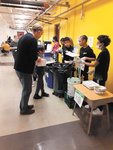
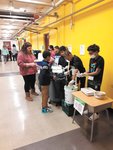
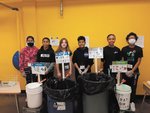
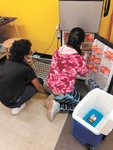
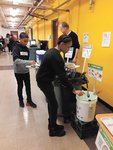
It all began this past fall, when the fifth grade students at Rhodes Elementary School began to notice how much food waste was taking place at breakfast time in school. They began to graph the wasted milk, fruit, yogurt, cereal/cereal bars, juice craisins/raisins and cheese sticks that were being tossed into the trash each day and their statistics were alarming. Upwards of 300 cartons of milk per week, even in short weeks, were going to waste. More than 100 cartons of juice, and more than 100 containers of fruit, all going in the garbage because as part of FDA requirements, students are required to take every part of a free breakfast even if they know they don’t want to eat it.
The students, who are in Susan Weber and Stephanie Pearson’s fifth and fourth-grade classes, decided to advocate for some changes to the way things were done in the cafeteria, and they were thrilled when Jim Corwin of the RI Recycling Club approached the school with a federally funded grant and a great deal of in-person support for a cafeteria recycling program at the school.
In partnership with the students, Aramark, the Cranston Public Schools food service provider, gave the classrooms insulated bags in which to store unused food that could be shared with others instead of thrown away, and they worked with the school to provide trays and other materials that were reusable or recyclable.
The students in Weber’s class were now deemed Cafeteria Rangers with titles such as Green Leader, Landfill Captain, Recycling Captain, Compost Captain and Liquid Captain. New cafeteria protocols were set up so that the student leaders were now helping students to pour out their liquids, and recycle their drink cartons, to put their compostable trash into a bin, and store unused food in a refrigerator so that it can be given to a local food pantry. The jobs rotated weekly, allowing everyone to take a turn. Within weeks of starting the program, the amount of food waste declined dramatically, down from four large garbage bags at the fourth and fifth grade lunch to one. The compost, which is picked up by Bootstrap Compost weekly, will later be brought back in the spring for the school’s community gardens. When the school has reached one ton of compost, Bootstrap will only charge half the price on the compost pickup.
“When we look for schools, we are looking for schools who are really ready to do this part of it,” said Jim Corwin of Get Food Smart, RI (rirecyclingclub.org). He’s on site for the first two weeks of the school programs to help train and oversee the students as they take on their new roles. “Rhodes School was such a perfect school, and statistically, elementary schools have the most food waste. Rhode Island recently passed a recycling bill which requires all schools to recycle by 2023. We’ve researched best practices for implementing these types of programs in schools and we’ve created a tool kit to help empower these kids. One of the biggest problems is the contamination of the compost, so we’ve trained them to keep an eye out for that.”
According to Weber, the students in the fifth grade really care about food waste and are proud to be the leaders who are implementing this type of work and education in the school.
“We talk a lot about community in class and about making a meaningful difference in the world. They feel a sense of pride in taking it to this level, and hopefully carrying it out even further at the community level,” she said.
As a Green Leader and one of the first students to be a Cafeteria Ranger, Olivia Graziano said she is happy to be doing something that teaches other kids about leadership and how to make a change.
Sam Vaca, a Landfill Captain, agreed.
“It’s a great program and it helps to reduce food waste,” he said. “We used to have four trash cans at just one lunch because everyone used to dump everything and now we have three trash cans total for all three lunches.”
Recycling Captain Calib Guertin said that his job carries with it a lot of responsibility.
“I have to make sure that they take their straws out of their milks and throwing them away, and that they are dumping it out with the Liquid Captain,” he said.
Despite the amount of responsibility they’re taking on, Liquid Captain Delaney Croke said being a part of the program is fun.
“It’s really fun and it’s cool to see how much change you can make. Pretty much everything can be recycled,” she said. “It’s also cool to see that we’re the first school in the Cranston Public Schools to do this and one of the only ones in the state.”
Ella Cambio, also a Liquid Captain, explained that the straws from the milk go to the landfill, but that the carton gets recycled and the milk gets poured out.
Corwin said that an upcoming waste audit will measure each component in the program, figuring out the percentage of trash and waste per student, and figure out if their goals are being met. The students will also use their data around the surplus of food and help to improve the process of ordering food for the school.
Principal Gina Armstrong is so pleased with the program and how it’s been received by the school community as a whole.
“This Get Food Smart, RI project has been very well received at Rhodes Elementary School. Our students are learning how to responsibly improve the environment by composting, recycling and donating extra food, and they are modeling this for the younger students in the building,” she said. “Students are excited to be directly involved in these efforts and take their cafeteria ranger jobs very seriously. I am very proud of them! It feels great to be significantly reducing the amount of food waste generated from Rhodes.”
Pearson and Weber are pleased as well and the hope is that the impact of the program will carry beyond the walls of Rhodes Elementary.
“My hope is that these kids will go home and see what’s not being composted there,” said Pearson. “In reality, these kids will be in green field types of careers, and this only prepares them further for their future.”
Comments
No comments on this item Please log in to comment by clicking here